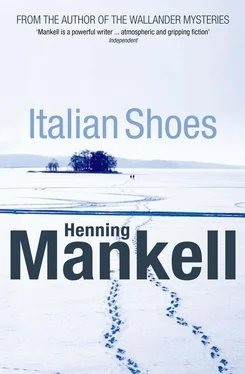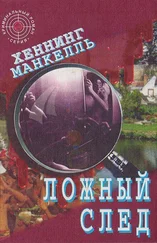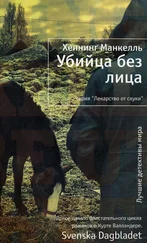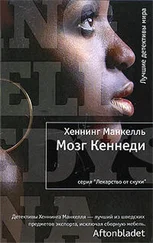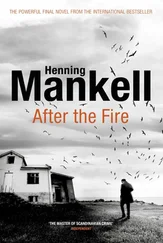Louise arrived on 7 December. The temperature had dropped, and at last autumn was giving way to winter. Rainwater in the rock crevices began to freeze at night. She had phoned from Copenhagen and asked me to arrange for Jansson to pick her up from the harbour. The connection was cut before I had time to ask her any more questions. I switched on the electric fire in her caravan, polished her shoes, cleaned up, and remade the bed with fresh sheets.
I hadn’t had a recurrence of the heart pains. I wrote a letter to Agnes and asked if she had finished thinking about my suggestion. She sent a picture postcard with her answer. The picture was of a painting by Van Gogh, and the text comprised two words: ‘Not yet.’
I wondered what Jansson had thought when he read the card.
Louise stepped on to the jetty carrying nothing but the rucksack she had taken with her in the first place. I had expected her to be struggling with large suitcases containing all the things she’d collected during her expedition. If anything, the rucksack seemed to be emptier now than it was when she set out.
Jansson appeared unwilling to leave. I gave him an envelope containing the fee he’d asked for his ferrying activities, and thanked him for his help. Louise greeted the dog. They seemed to get along like a house on fire. I opened the door to the caravan, which had become nicely warm. She deposited her rucksack there, then accompanied me to the house. Before we went in, she paused for a moment by the little mound marking the grave under the apple tree.
I grilled some cod for dinner. She ate it as if she hadn’t eaten in weeks. I thought she looked paler and perhaps even thinner than she was before. She told me that the plan to gatecrash the summit meeting had been hatched before she left the island.
‘I sat down on the bench by the boathouse and worked it all out,’ she said. ‘I didn’t feel there was any point in writing the letters any more. It had dawned on me that they might never have been meaningful for anybody apart from myself. So I chose another way.’
‘Why didn’t you say anything?’
‘I don’t know you well enough. You might have tried to stop me.’
‘Why should I have done that?’
‘Harriet always tried to make me do what she wanted. Why should you be any different?’
I tried to ask her more questions about her expedition, but she shook her head. She was tired, needed to get some rest.
At midnight I saw her to the caravan. The thermometer outside the kitchen window was showing plus one degree. She shuddered in the cold and took my arm. That was something she had never done before.
‘I miss the forest,’ she said. ‘I miss my friends. But this is where the caravan is now. It was kind of you to heat it up for me. I shall sleep like a log, and dream about all the paintings I’ve seen during the past few months.’
‘I’ve brushed your red shoes for you,’ I said.
She kissed me on the cheek before vanishing into the caravan.
Louise kept out of the way for the first few days after her return. She came to eat when I shouted for her, but she didn’t say much and could become irritated if I asked too many questions. One evening I went down to the caravan and peered in through the window. She was sitting at the table, writing something in a notebook. She suddenly turned to look at the window. I crouched down and held my breath. She didn’t open the door. I hoped she hadn’t seen me.
While I was waiting for her to become accessible again, I went for long walks with the dog every day, to keep myself in shape. The sea was blue-grey, fewer and fewer seabirds were around. The archipelago was withdrawing into its winter shell.
One evening I wrote what was to be my new will. Everything I owned would go to Louise, of course. What I had promised Agnes kept gnawing away at me, but I did what I’ve always done in such circumstances: pushed nagging worries to the back of my mind and convinced myself that things would sort themselves out if and when they came to a head.
In the morning of the eighth day after her return Louise was sitting at the kitchen table when I came downstairs at about seven.
‘I’m not tired any more,’ she said. ‘I can face other people now.’
‘Agnes,’ I said. ‘I’ve invited her to come here. Maybe you can convince her that she ought to move here with her girls.’
Louise looked at me in surprise, as if she hadn’t heard properly what I’d said. I had no idea of the danger that was creeping up on me. I told her about Agnes’s visit, but needless to say didn’t mention what had happened between us.
‘I thought I’d let Agnes and her girls come to live here when they no longer have the house where she runs her care home.’
‘You mean you’re going to give the island away?’
‘There’s only me and the dog here. Why shouldn’t this island start being useful again?’
Louise was furious and slammed her fist down on the coffee cup on the table in front of her. Bits of cup and saucer splattered into the wall.
‘So you’re going to give away my inheritance? Aren’t you going to leave me anything when you’ve gone? — I haven’t had a thing from you so far.’
I found myself stuttering when I replied.
‘I’m not giving her anything. I’m just letting her stay here.’
Louise stared at me long and hard. It felt as if I was confronted by a snake. Then she stood up so violently that her chair fell over. She took her jacket and stormed out, leaving the door open. I waited and waited for her to come back.
I closed the door. At last I understood what it had meant to her that day when I turned up outside her caravan. I had given her a possession. She had even given up the forest for the sea, for me and my island. Now she thought I was taking all that away from her.
I had no heirs apart from Louise. I had once entertained the thought of giving the island to some archipelago trust or other. But that would only mean that, at some point in the future, greedy politicians would sit on my jetty and enjoy the sea. Now everything had changed. If I fell down and died that very night, Louise would be my direct heir. What she did with it then would be entirely up to her.
She didn’t appear at all the next day. In the evening, I went to the caravan. Louise was lying on the bed. Her eyes were open. I hesitated before knocking on the door.
‘Go away!’
Her voice was shrill and tense.
‘We must talk this over.’
‘I’m getting out of here.’
‘Nobody will ever take this island away from you. You don’t need to worry.’
‘Go away!’
‘Open the door!’
I tried the handle. It was unlocked. But before I could move she had flung it open. It smashed into my face. My bottom lip split open, I fell over backwards and hit my head on a stone. Before I could get up she had thrown herself on top of me and was hitting me about the face with what remained of an old cork lifebelt that had been lying nearby.
‘Stop it. I’m bleeding.’
‘You’re not bleeding enough.’
I grabbed hold of the lifebelt and wrenched it from her grasp. Then she started punching me. I eventually managed to wriggle out of her clutches.
We faced each other, panting.
‘Come up to the house. We have to talk.’
‘You look awful. I didn’t mean to hit you so hard.’
I went back to the kitchen, and was shocked when I saw my face covered in blood. I could see that not only my lip but also my right eyebrow had been split open. She knocked me out, I thought. She’d made good use of her boxing skills, even if it was the caravan door that had landed the most telling blow.
I wiped my face and wrapped some ice cubes in a towel which I pressed on my mouth and eyebrow. It was some time before I heard her footsteps approaching the door.
Читать дальше
